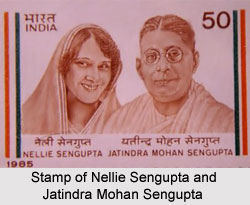 Jatindra Mohan Sengupta was a well known Indian freedom fighter and one of the most prominent Indian revolutionaries who fought against the British in order to achieve independence. He was born in the year 1885 in Barama in the district of Chittagong, presently in Bangladesh. He was the son of Jatra Mohan Sengupta, who was an advocate and a member of the Bengal Legislative Council. Jatindra Mohan Sengupta successfully completed his education from the Presidency College, Calcutta (now Kolkata). In the year 1904, Sengupta went to England to acquire his Bachelors Degree in Law from the Downing College. During that period, he met with a British lady named Nellie Gray and eventually married her despite opposition from her parents. The newly wed couple returned to India and settled in the district of Chittagong in the year 1909. Jatindra Mohan Sengupta started his legal practice as a barrister during this time.
Jatindra Mohan Sengupta was a well known Indian freedom fighter and one of the most prominent Indian revolutionaries who fought against the British in order to achieve independence. He was born in the year 1885 in Barama in the district of Chittagong, presently in Bangladesh. He was the son of Jatra Mohan Sengupta, who was an advocate and a member of the Bengal Legislative Council. Jatindra Mohan Sengupta successfully completed his education from the Presidency College, Calcutta (now Kolkata). In the year 1904, Sengupta went to England to acquire his Bachelors Degree in Law from the Downing College. During that period, he met with a British lady named Nellie Gray and eventually married her despite opposition from her parents. The newly wed couple returned to India and settled in the district of Chittagong in the year 1909. Jatindra Mohan Sengupta started his legal practice as a barrister during this time.
Career of Jatindra Mohan Sengupta
Barrister Jatindra Mohan Sengupta began his political career in the year 1911 by representing Chittagong district in the Bengal Provincial Conference held at Faridpur. He became elected Secretary of the Indian National Congress party and consequently became the Chairman of the Bengal Reception Committees. Later in 1921, Sengupta discontinued his profession as a Lawyer and participated in the Non Cooperative Movement that was called by Mahatma Gandhi. Jatindra Mohan became an elected member of the Bengal Legislative Council in 1923.
Revolutionary and Political Activities of Jatindra Mohan Sengupta
Barrister Jatindra Mohan Sengupta was the antecedent of the Trade Union Movement and later was appointed as the President of the Assam Bengal Railway Union, as well as the Burma Oil Labour Union during the rule of British Empire in India. After the death of Chittaranjan Das, another freedom fighter who significantly contributed in the Indian freedom struggle, in the year 1925, Jatindra Mohan Sengupta became the elected President of the Bengal Swaraj Party. Afterwards, he was appointed as the President of the Bengal Provincial Congress Committee and led the Congress Party in the Bengal Legislative Council.
Sengupta also led the Congress Municipal Association in Calcutta (now Kolkata). He was adoringly addressed as Deshpriya Jatindra Mohan Sengupta for his selfless contribution towards the overall development of the country and the betterment of the citizens.
Barrister Jatindra Mohan Sengupta died in a prison in Ranchi on 23 July, 1933.



















